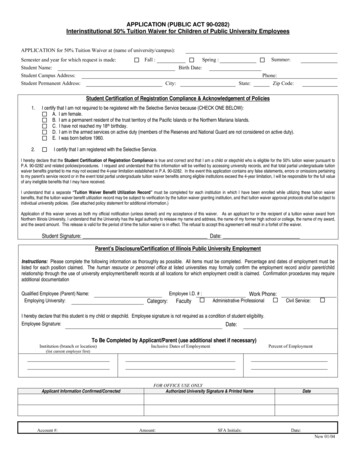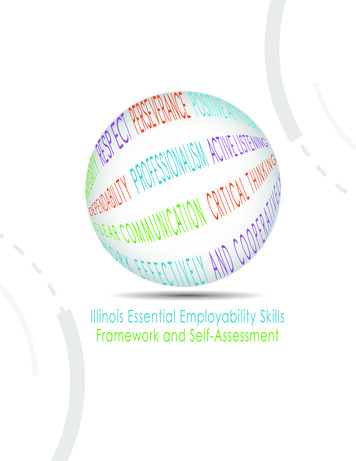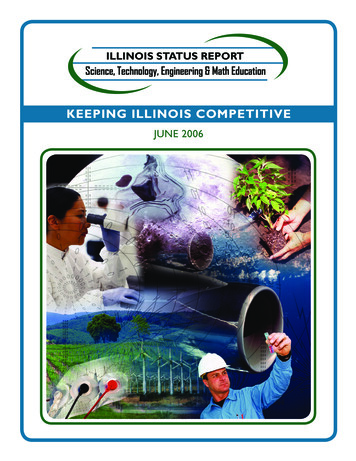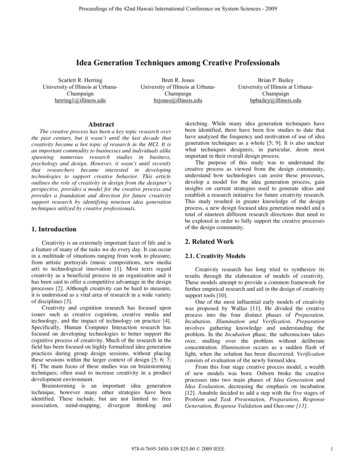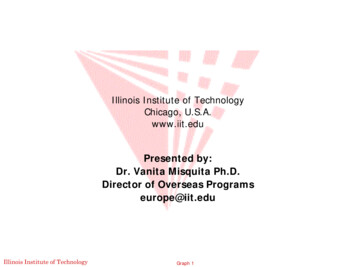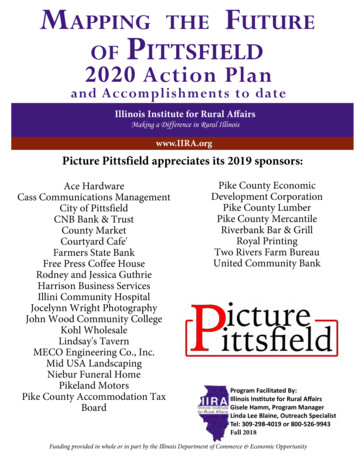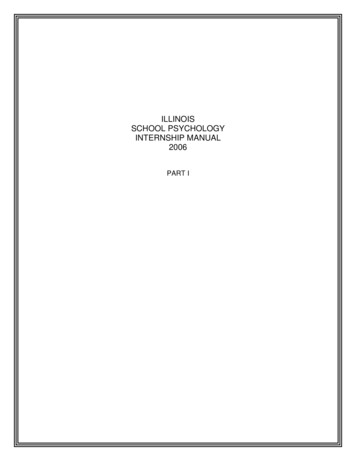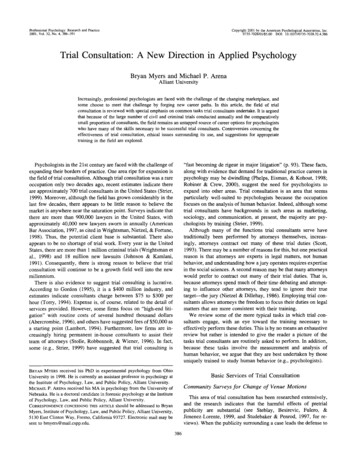
Transcription
Psychology1PSYCHOLOGY3424 South State StreetTech Central, Room 201Chicago, IL it.edu/psychologyChairFrank LaneAssociate Chair, AdministrationKristina BauerAssociate Chair, ResearchPatrick CorriganDirector, Clinical PsychologyGregory ChassonDirector, Industrial and Organizational PsychologyScott MorrisDirector, Counseling and Rehabilitation ScienceKelly KazukauskasFaculty with Research InterestsFor more information regarding faculty visit the Department of Psychology website.The Department of Psychology offers graduate programs in clinical psychology, industrial-organizational (I-O) psychology, rehabilitationcounseling education, and rehabilitation and mental health counseling. The department’s goal is to provide students with a scientistpractitioner model of training that integrates theory, research, and practice. Each program requires specific research, practicum, internship,and curricular activities, which are linked to the specific goals of the individual training program.Research CentersPsychology faculty and students collaborate on applied research projects through the Center for Research and Service (CRS). Foundedas the IIT Institute for Psychological Services in 1943, the CRS has an exceptional track record of providing organizations with meaningfulmetrics for managing human resources and has existed as a consulting unit since 1998. Leveraging the skills of faculty, students, and staff,the CRS evolved into one of the country’s premier university-based research and services firms. Today, the CRS supports and educatesadvanced graduate students to deliver high quality professional services such as assessing, developing, and leveraging the potential ofclients' employees.The National Consortium on Stigma and Empowerment (NCSE) is a research group meant to promote recovery from mental illness byunderstanding the stigma associated with mental illness and promoting personal empowerment. The consortium (ncse1.org), largely fundedby NIMH, is located at Illinois Institute of Technology, directed by Patrick Corrigan, and includes a collection of researchers at Yale University,the University of Pennsylvania, Rutgers University, Temple University, Dartmouth University, the University of Illinois-Chicago, and New YorkUniversity.The Chicago Health Disparities Center (CHDS) is a research group funded through the National Institute on Minority Health and HealthDisparities (NIMHD) and Patient Centered Outcomes Research Institute (PCORI). Located at Illinois Institute of Technology and directedby Patrick Corrigan and Lindsay Sheehan, CHDC (chicagohealthdisparities.org), is committed to reducing health disparities for racial andethnic minorities with mental illness. CHDC is partnered with Chicago area universities, service provider organizations, and public partners,including the Chicago Department of Public Health.Research FacilitiesFacilities include laboratories for human behavioral assessment studies, psychophysiological research, infant and maternal attachmentresearch, and testing and interviewing laboratories with one-way mirror viewing. Special computer and video equipment are part of theresearch facilities. There are graduate student offices, a testing library, and a student lounge. Many journals and databases are availablethrough the university’s libraries.
2PsychologyResearch AreasClinical psychology faculty interests include: health psychology, child social and emotional development, eating disorders, anxiety andrepetitive behavior, and neuropsychological functioning. Some clinical students work with rehabilitation faculty in areas such as: adjustmentto disability, stages of change, stigma and prevention, psychiatric rehabilitation, and cross-cultural issues.Industrial-organizational faculty interests include: leadership, diversity, cross-cultural issues, work-family interface, training anddevelopment, employee selection, employment discrimination, quantitative methods and psychometrics, occupational health, andhumanitarian work psychology.Counseling and rehabilitation science faculty pursue research in the areas of: mental health counseling, adjustment to disability, vocationalrehabilitation, factors affecting job placement, rehabilitation engineering technology, psychiatric rehabilitation, ethics and ethical issues incounseling, and clinical supervision.Program DescriptionsThe Clinical Psychology Program offers a Ph.D. in Psychology with a specialization in Clinical Psychology. The clinical psychology Ph.D.program has been fully accredited for over 36 years by the American Psychological Association, and offers training from the cognitivebehavioral framework. Based on the Boulder scientist-practitioner model, the program emphasizes an integration of clinical practiceand applied clinical research. Working with a faculty mentor, students begin research work their first year. Students in the rehabilitationspecialization track take rehabilitation courses as electives and do research with rehabilitation faculty. Clinical practicum experiencestake place at general and specialized clinical sites throughout the Chicago area. All students complete an APA-accredited internship. Theprogram prepares students to be license-eligible in the state of Illinois and most other states. Graduates typically function as practitionersand researchers in medical centers and multi-disciplinary clinical settings.The Industrial-Organizational Psychology Program offers a M.S. in Industrial-Organizational Psychology and a Ph.D. in Psychology with aspecialization in Industrial-Organizational Psychology. The program emphasizes a science-practice model of training. Students undertakea balanced education in personnel and organizational topics, disciplines, and research. The program strengthens students’ quantitativeskills for research and consulting. All students complete internships within various organizations where students are responsible for humanresource management and development functions. Students in the industrial-organizational master’s degree program receive the knowledgeand skills necessary for professions in human resources, as well as management consulting positions. Ph.D. students will acquire a strongtheoretical and methodological background in various areas of I-O psychology and are required to complete a minimum of two researchprojects. Many students in the past have presented and published their work. The Ph.D. curriculum prepares students to choose fromseveral career paths in consulting, corporate human resources, or research and teaching.The Division of Counseling and Rehabilitation Science offers a M.S. in Rehabilitation and Mental Health Counseling, a Ph.D. in RehabilitationCounseling Education, and a Ph.D. in combined clinical/rehabilitation psychology.M.S. – Rehabilitation and Mental Health Counseling (RMHC): The mission of the Rehabilitation and Mental Health Counseling Program isto prepare master’s degree students to perform a vital role as counselors who have specialized knowledge and skills for both rehabilitationand clinical mental health counseling service delivery. This includes the ability to serve persons with a diverse array of problems impactingthe individual, and/or the family, in a variety of clinical settings and with respect for the influences of multicultural factors such as culture,ethnicity, race, religion, gender, and sexual orientation. Students also receive specialized training in the vocational, educational, and personaladjustment of persons with physical, mental, and emotional disabilities. The objectives of the program are:1. To train individuals in the practice of rehabilitation and clinical mental health counseling, which includes specialized knowledge in andexperience related to counseling and treatment modalities appropriate for the service of a variety of clients in diverse rehabilitation andmental health counseling settings;2. To develop mature, capable professionals who are able to relate constructively to clients, to work with clients to facilitate behaviorchange, demonstrate therapeutic interaction skills, and to facilitate the client’s development of problem-solving skills; and3. To prepare students for professional service and leadership within the fields of rehabilitation and mental health counseling.This program prepares counselors for employment in community mental health facilities; state, federal, and private rehabilitation agencies;hospitals; correctional institutions; public schools; rehabilitation centers; and other organizations serving persons with physical, psychiatric,mental, social, or emotional disabilities. The Ph.D. program prepares individuals for careers in university teaching, research, and clinicalpractice in rehabilitation counseling.Ph.D. – Rehabilitation Counseling Education (RCE): The Rehabilitation Counseling Education Ph.D. program prepares individuals for careersin university teaching, research, and clinical practice with specific emphasis on rehabilitation counseling. The mission of the RCE Programat Illinois Tech is to offer a student-focused and research-based curriculum that prepares doctoral-level students to become professionalcounselor educators trained to perform advanced-level counseling, post-secondary teaching, clinical supervision, research, scholarship,leadership, and advocacy activities. The objectives of the program are:
Psychology31. To train Ph.D. level rehabilitation counselor educators who in turn will train clinical rehabilitation counselors to work with people withsevere disabilities;2. To provide students with a thorough grounding in rehabilitation and counseling philosophy, practices, research, processes, and ethics;and3. To prepare students for professional service, leadership, and advocacy within the field of rehabilitation counseling education.Students receive outstanding and intensive training in all aspects of rehabilitation counseling. The program seamlessly integrates teaching,research, and field-based experiences, providing first-rate practica and internship experiences to prepare students to become leaders in thefield of rehabilitation counseling education.The Division of Counseling and Rehabilitation Science has several funding opportunities to support students as they pursue their academicendeavors. Based on availability and with consideration of academic excellence, leadership potential in the field, and financial need, thefollowing opportunities may be available: RSA Scholarships: Since its inception, the Rehabilitation Services Administration (RSA) of the U.S. Department of Education hascontinuously funded the university's rehabilitation counselor education programs. The RSA traineeships are designed to increase thenumber of practicing rehabilitation counselors for the state/federal vocational rehabilitation program by covering the cost of tuitionand books. Traineeship grants, when available, may cover up to full tuition plus a monthly stipend to a limited number of students. Thedepartment also awards teaching and research assistantships, which cover partial tuition as well as provide a stipend. The amount ofthe stipend and tuition scholarships depends upon the terms of the appointment. Graduate assistantships: The division has relationships with several departments within the university that provide part-timeemployment opportunities and partial tuition support to students within the Division of Counseling and Rehabilitation Science. Teaching assistantships: Students within the Division of Counseling and Rehabilitation Science may apply for teaching assistantpositions during their second and subsequent years within their program. The International and Multicultural Counseling Scholarship: This scholarship specifically supports the academic endeavors of Divisionof Counseling and Rehabilitation Science students who demonstrate an interest in/passion for international and/or multiculturalrehabilitation and mental health counseling issues.Admission RequirementsMinimum Cumulative Undergraduate GPA3.0/4.0Minimum GRE Scores298 (quantitative verbal), 3.0 (analytical writing)Minimum TOEFL Scores80/550 (internet-based/paper-based test scores)Note: Degree/concentration requirements may exceed those listed here.Three letters of recommendationThe master’s program in rehabilitation and mental health counseling does not require the GRE. Each degree program is unique, but thestated minimum requirements are typical values and meeting the minimum GPA and test score requirements does not guarantee admission.Test scores and GPA are just two of several important factors considered. At least 18 credit hours of undergraduate study in psychology or arelated field are required.Applicants for master’s degree programs should have a bachelor’s degree from an accredited institution and meet the minimum standardslisted above. The exception is the master’s in rehabilitation and mental health counseling; undergraduate general psychology courses arethe only required prerequisites for that program. Prerequisite to admission to doctoral programs are a bachelor’s or master’s degree from anaccredited institution, superior academic records in both undergraduate and graduate programs, and favorable academic recommendations.GRE results are required for all psychology doctoral programs. Applications for admission are evaluated by separate committees foreach program (clinical, industrial-organizational, rehabilitation, rehabilitation counseling education, and rehabilitation and mental healthcounseling). Therefore, a prospective student must designate a specialty area on the appropriate form. GPA and test score requirementsmay be higher for some degrees or concentrations.Degrees Offered Master of Science in Industrial-Organizational Psychology Master of Science in Psychology Master of Science in Rehabilitation and Mental Health Counseling Master of Science in Rehabilitation and Mental Health Counseling with Advanced Standing
4Psychology Doctor of Philosophy in Psychology with Specialization in Clinical Psychology Doctor of Philosophy in Psychology with Specialization in Clinical Psychology: Rehabilitation Track Doctor of Philosophy in Psychology with Specialization in Industrial-Organizational Psychology Doctor of Philosophy in Rehabilitation Counseling EducationCertificate Programs Psychiatric Rehabilitation Rehabilitation Counseling Rehabilitation Engineering Technology
Psychology5Course DescriptionsPSYC 501Biological Bases of BehaviorA critical review of the anatomical and neurophysiological bases ofbehavior as related to theory and practice in psychology.Lecture: 3 Lab: 0 Credits: 3PSYC 502Social Bases of BehaviorCritical overview of theory and research in social cognition,interpersonal relations, group dynamics and organizationalpsychology. Implications of principles for issues and problems inreal-world social systems are developed.Lecture: 3 Lab: 0 Credits: 3PSYC 503Cognitive and Affective BasesCritical overview of cognition, affect, and their intersection based ona variety of theories and approaches.Lecture: 3 Lab: 0 Credits: 3PSYC 504Individual and Cultural DifferencesReview of the basic models used to explore and explain how andwhy people differ from each other. The course will explore theinfluence of culture and individual characteristics such as gender,ability and personality, as well as how these influences change overa person's lifetime.Lecture: 3 Lab: 0 Credits: 3PSYC 508Ethics and Professional Issues IThis is an introductory course designed around ethical issuesconfronting clinical psychologists. It is offered to incoming firstyear clinical students to allow them to think about ethical issues intreatment, assessment, and professional behavior. Using the APAethics code as a guide, students present and respond to ethicaldilemmas that they may face as they embark upon their career asclinical psychologists. Other professional issues are also discussedincluding the transition to graduate school, course selectiondecisions, and any other general graduate school questions thatmay arise.Lecture: 2 Lab: 0 Credits: 2PSYC 509Ethics and Professional Issues IIThis is a continuation of PSYC 508 but offered to second semester,third year students. It is designed to prepare students for thelater parts of the graduate student experience. Topics includedissertation research, the internship experience, early job and careerdecisions, supervision, and consultation. Barriers to successfulcompletion of the program are discussed and problem solved.Ethical issues such as those confronting new Ph.D.'s are alsointroduced.Lecture: 1 Lab: 0 Credits: 1PSYC 505History and Systems of PsychologyCritical and conceptual evaluation of influential philosophical andpsychological theories of human behavior: From the Greek bronzeage to the modern era.Lecture: 3 Lab: 0 Credits: 3PSYC 510Clinical Assessment ISeminar and supervised training in intellectual and cognitiveassessment for adults and children. Research, psychometriccharacteristics, conceptual foundations, clinical applicability,administration, scoring and interpretation of major assessmentinstruments, and writing reports. Requires active standing in theclinical program. Instructor permission required.Lecture: 3 Lab: 0 Credits: 3PSYC 506Therapy IBasic clinical skills including intake, suicide assessment, caseformulation, differential diagnosis, and basics of conductingcognitive behavioral therapy. Taken when not preceded by PSYC 518(Basic Clinical Skills).Prerequisite(s): PSYC 533* with min. grade of C and PSYC 523 withmin. grade of B, An asterisk (*) designates a course which may betaken concurrently.Lecture: 3 Lab: 0 Credits: 3PSYC 511Psychometric TheoryBasic understanding of principles and theories of psychologicalmeasurement emphasizing (1) theories and methods for estimationof reliability and validity, (2) techniques for the measurementof psychological variables and (3), methods for construction ofpsychological and educational measuring instruments.Prerequisite(s): PSYC 546 with min. grade of C and PSYC 545 withmin. grade of CLecture: 3 Lab: 0 Credits: 3PSYC 507Therapy IISecond semester seminar and supervised training in basicclinical skills, including interviewing, development of a therapeuticrelationship, managing the process of therapy and assessingtherapy progress. Requires active standing in the clinical programand approved clinical placement.Prerequisite(s): PSYC 533* with min. grade of C and PSYC 506 withmin. grade of B, An asterisk (*) designates a course which may betaken concurrently.Lecture: 3 Lab: 0 Credits: 3PSYC 512Clinical Assessment IISeminar and supervised training in personality assessment of adultsand children. Research, psychometric characteristics, conceptualfoundations, clinical applicability, administration, scoring andinterpretation of major assessment instruments, and writing reports.Prerequisite(s): PSYC 526 with min. grade of BLecture: 3 Lab: 0 Credits: 3
6PsychologyPSYC 513Assessment in Rehabilitation and Mental Health CounselingAn overview of test selection, administration, and interpretationthrough synthesis, integration, and evaluation of assessmentdata used in rehabilitation and mental health counseling. Includeshistorical perspectives in assessment, statistical concepts, anorientation to standardized and non-standardized tests, and theprocess and practice of assessing adults with disabling conditionsfor rehabilitation plan development and vocational decision-making.Lecture: 3 Lab: 0 Credits: 3PSYC 514Vocational Evaluation II: Report Development and CommunicationThe process of developing vocational evaluation and staffingreports. Gathering, analyzing, integrating, synthesizing, andinterpreting evaluation information. Development of feasiblerecommendations utilizing related sources of labor market/occupational information.Prerequisite(s): PSYC 513 with min. grade of CLecture: 3 Lab: 0 Credits: 3PSYC 515Vocational Evaluation LaboratoryPractical skills in vocational evaluations including application ofwork samples and situational assessment at a vocational evaluationsite in the community.Lecture: 3 Lab: 0 Credits: 3PSYC 517Performance Appraisal SeminarThe objectives of the seminar are to 1) provide a broadunderstanding of the multiple facets of performance appraisal, 2)understand research and advances in the field, and 3) understandthe challenges and pitfalls of successfully implementing a PAsystem in an organization.Prerequisite(s): PSYC 556 with min. grade of C and PSYC 529 withmin. grade of CLecture: 3 Lab: 0 Credits: 3PSYC 518Basic Clinical SkillsThis course covers introductory therapy skills including intake,suicide assessment, case formulation, and differential diagnosis.Prerequisite(s): PSYC 526 with min. grade of CLecture: 1 Lab: 0 Credits: 1PSYC 519Therapy I-ABasics of conducting cognitive behavioral therapy followingPSYC 518 (Basic Clinical Skills).Prerequisite(s): PSYC 518 with min. grade of CLecture: 2 Lab: 0 Credits: 2PSYC 520Health PsychologyIntroduction to theoretical, clinical and research issues in adultbehavioral medicine. Covers general perspectives of a biobehavioralapproach, factors affecting adult health and illness, diagnostic andtreatment approaches, and issues in research and application.Lecture: 3 Lab: 0 Credits: 3PSYC 523Theories of PsychotherapySurvey of various approaches to therapeutic intervention. Theconceptual bases, history, methods, empirical foundations andapplicability of important schools of therapeutic intervention will beconsidered.Lecture: 3 Lab: 0 Credits: 3PSYC 524Assessment and Treatment of Infants and Young ChildrenReviews current conceptualizations, assessment and treatmentof childhood disorders from a behavioral-system perspective.Examines the impact of the family, school and other relevantsystems on the development and treatment of child behaviorproblems.Lecture: 3 Lab: 0 Credits: 3PSYC 525Developmental PsychopathologyThis course covers theory and research on developmental processesand their functions to promote health and as risk factors forpsychopathology.Lecture: 3 Lab: 0 Credits: 3PSYC 526PsychopathologyCritical examination of clinical and experimental research inpsychopathology and diagnostic classification systems.Lecture: 3 Lab: 0 Credits: 3PSYC 529Personnel Selection and EvaluationPrinciples and techniques of employee selection and placement.Analysis of test data which will maximize the effectiveness of suchtechniques.Lecture: 3 Lab: 0 Credits: 3PSYC 530Meta-AnalysisThe overall objectives of this seminar are to (a) provide exposureto the theoretical and applied literatures on meta-analysis, and(b) develop skills in critiquing and conducting meta-analyses. Themajor areas of theory and research that will be examined in thiscourse include (a) the conceptual and measurement literaturesfocusing on individual difference constructs, (b) an introduction toclassical reliability theory and statistical theory underlying metaanalysis procedures, and (c) studies evaluating the generalizabilityof relationships involving individual differences and situationalvariables.Prerequisite(s): PSYC 511 with min. grade of CLecture: 3 Lab: 0 Credits: 3
PsychologyPSYC 531Organizational Attitudes and Behavioral SeminarThe course is an in-depth study of factors that affect Organizationalbehavior and attitude (motivational theories). The various keyattitudes and behaviors that organizations are defined andresearch relating to them is discussed (e.g. job satisfaction,organizational commitment, job involvement, turnover, absenteeism,and organizational citizenship). We also identify the stresses ontoday's employees' life and discuss some ways to manage them(e.g. job stress, work-family conflict, minority and immigrant worker.Prerequisite(s): PSYC 556 with min. grade of CLecture: 3 Lab: 0 Credits: 3PSYC 532Occupational Health PsychologyThis survey course is designed to provide a broad overview of thefield of occupational health psychology (OHP). OHP is an excitingfield that examines the bidirectional relationship between workpsychology on the one hand and individual and organizationalhealth on the other. We will review major theories and empiricalresearch linking work and organizational factors (organizationaljustice, dark workplace behaviors such as incivility, shift-work, workfamily interface) with employee health and well-being (stress, affect,job-burnout, recovery experiences) along with interventions andexperiences designed to promote occupational health.Prerequisite(s): PSYC 556 with min. grade of CLecture: 3 Lab: 0 Credits: 3PSYC 533Clinical PracticumClinical assessment, therapy and/or consultation in a communitybased mental health setting or medical facility for an average of15 to 20 hours per week, per semester. Students obtain supervisedexperience in the provision of psychological services and relatedprofessional activities. Must be in an approved clinical placementsite.Credit: VariablePSYC 534Attachment Theory Throughout the LifespanProvides an in depth understanding of attachment theory andresearch, as well as clinical applications throughout the life span.Instructor permission required.Lecture: 3 Lab: 0 Credits: 3PSYC 535Seminar in Personnel SelectionA critical review of advanced techniques in personnel selection.Includes such topics such as validity generalization, utility analysis,and applications of latent trait theory.Prerequisite(s): PSYC 511 with min. grade of CLecture: 3 Lab: 0 Credits: 3PSYC 536Affective DisordersExamination of current theory and research regarding affectivedisorders. Covers cognitive, behavioral, biological, and culturalperspectives. The relationship of affective symptomatology anddiagnosis to other types of psychopathology are considered.Prerequisite(s): PSYC 526 with min. grade of CLecture: 3 Lab: 0 Credits: 37PSYC 537Child Cognitive DevelopmentThe course is designed to be a practical primer on the changes incognition that occur from ages five to seven when there is a majorchange in how children perceive their world and how the worldperceives them.Lecture: 3 Lab: 0 Credits: 3PSYC 538Psychology of Sport, Performance, and HealthThe course examines the clinical and research literature on thephysical and psychological benefits of the following: regularphysical activity; psychological, social, and environmental aspectsof exercise non-adherence; and mental and behavioral strategiesfor promoting motivation, confidence, concentration, and enhancedsport performance.Lecture: 3 Lab: 0 Credits: 3PSYC 540Research MethodsThis course prepares students for designing and interpretingempirical research. The collection of meaningful data, appropriateuse of data analytic techniques, and the interpretation of dataresults are presented.Lecture: 3 Lab: 0 Credits: 3PSYC 545Graduate Statistics IBasic course in elementary statistics Introduction to inferentialstatistics and statistical analysis of psychological data. Emphasison hypothesis testing procedures and computer applications.Lecture: 3 Lab: 0 Credits: 3PSYC 546Graduate Statistics IIStatistical procedures used in the prediction and explanation ofpsychological data, including multiple regression. Emphasis oncomputer applications.Prerequisite(s): PSYC 545 with min. grade of CLecture: 3 Lab: 0 Credits: 3PSYC 547Evidence-Based Practice in Rehabilitation and Mental HealthCounselingThe objective of this course is to familiarize students with evidencebased practice (EBP) in the field of rehabilitation and mental healthcounseling. Students will be introduced to a variety of evidencebased models in rehabilitation and mental health counseling as wellas current issues in EBP. The historical development of EBP will beexplored, and current empirical research will be examined.Lecture: 3 Lab: 0 Credits: 3PSYC 548Vocational Psychiatric RehabilitationAn in depth review of models available to help people with severemental illness obtain and maintain employment. Topics relating tovocational evaluation, work adjustment, placement, supported workmodels, and follow-up will be covered.Lecture: 3 Lab: 0 Credits: 3
8PsychologyPSYC 549Practicum in Rehabilitation and Mental Health CounselingSeminar and supervised experience in rehabilitation and mentalhealth counseling with an emphasis on development of individualcounseling skills. Students work in a field-based rehabilitation andmental health counseling capacity carrying a small client caseloadwhile participating in weekly individual and group supervision.Includes topics related to counseling processes, procedures, andtheories; ethics; and crisis prevention, assessment, and intervention.Prerequisite(s): PSYC 410 with min. grade of C and PSYC 557 withmin. grade of C and PSYC 523 with min. grade of CCredit: VariablePSYC 550Couples Research and TherapyAdvanced seminar introduces students to empirically basedinterventions for couples. Presents clinically relevant and empiricallyderived material to better understand the importance of bothtechnique and theory when intervening at a couples level.Lecture: 3 Lab: 0 Credits: 3PSYC 552Legal Issues in Human Resource ManagementSeminar on the legal context of human resource management,focusing on equal employment opportunity laws. Will discuss how todesign employee selection, evaluation and compensation systemsthat comply with U.S. federal laws and regulations.Prerequisite(s): PSYC 529 with min. grade of CLecture: 3 Lab: 0 Credits: 3PSYC 553Family and Couples TherapySurveys the major theoretical perspectives for understanding andintervening with family and marital problems.Lecture: 3 Lab: 0 Credits: 3PSYC 554Survey of Multivariate StatisticsIntroduction to the major multivariate statistical procedures usedin psychology; factor analysis, discriminant analysis, multivariateanalysis of variance and canonical correlation.Prerequisite(s): PSYC 545 with min. grade of C or PSYC 546 withmin. grade of CLecture: 3 Lab: 0 Credits: 3PSYC 555Seminar in Industrial TrainingSurvey of various types
The Clinical Psychology Program offers a Ph.D. in Psychology with a specialization in Clinical Psychology. The clinical psychology Ph.D. program has been fully accredited for over 36 years by the American Psychological Association, and offers training from the cognitive-behavioral framework.
